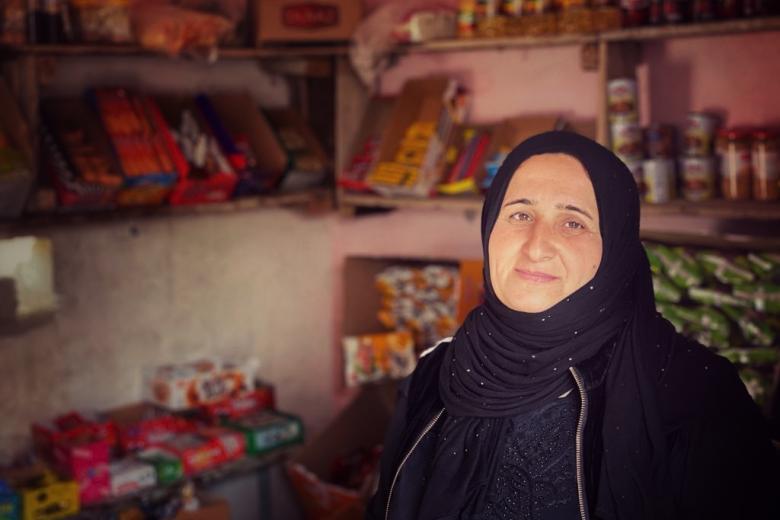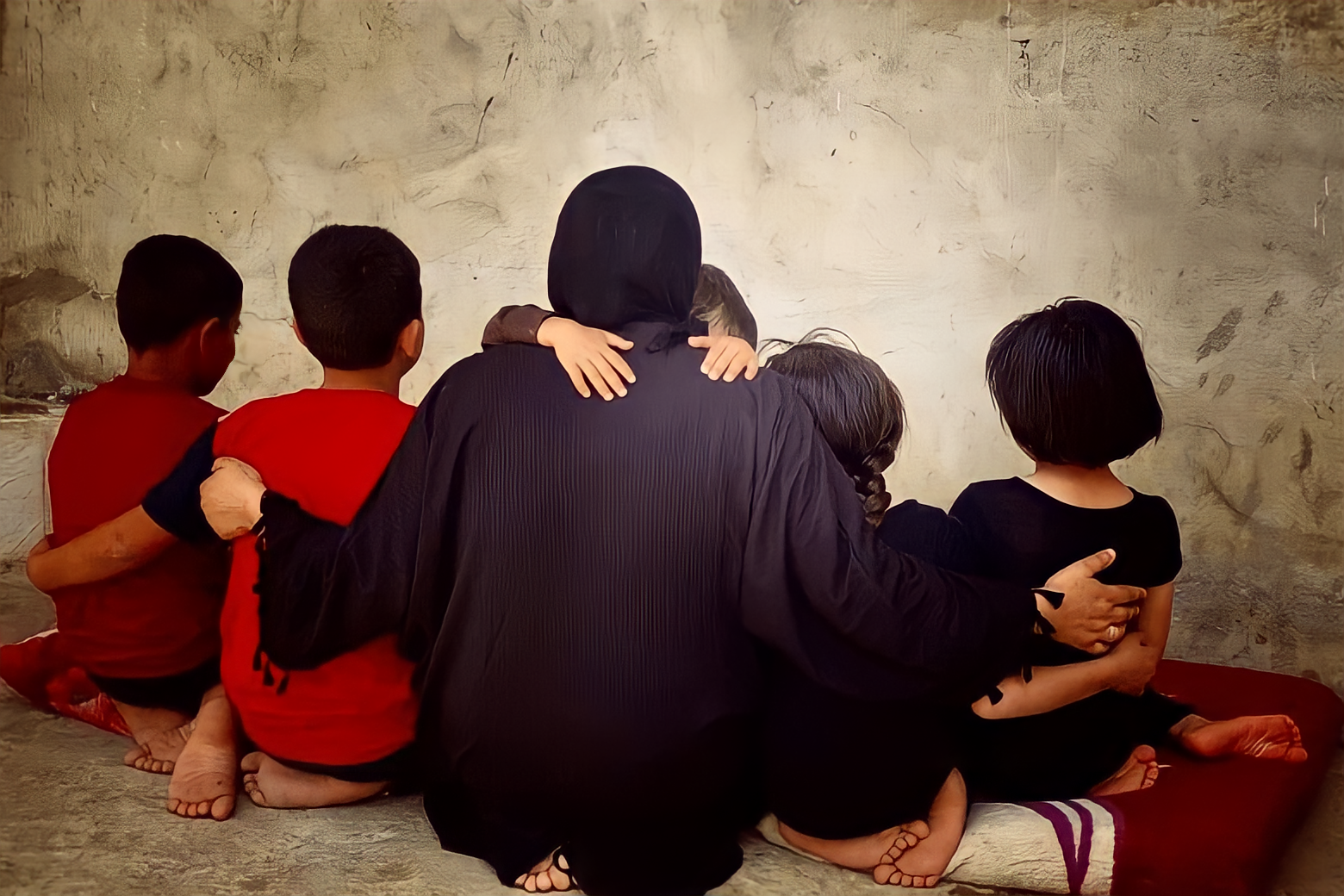Kawther and Fatma have been making sacrifices since they were teenagers. All their dreams were lost when forced to marry.
Despite the difficult living conditions in Ninewa, both Kawther and Fatima are running small projects to provide sources of income to create a better future for their children, thanks to the financial assistance of international organizations, according to the United Nations Development Program (UNDP).
The scattered dream of childhood
Kawther had a dream. Her dream was to become a doctor. But this dream scattered like sand in the wind when she was withdrawn from school in her second year of primary school.
That is the story of Kawther*, today aged twenty-eight. She unhappily recounts how she lost her schooling and her dreams with them. After her father kept her home and out of school, she joined the rest of her family of eleven members to help farm and raise sheep and cows.
Kawther comes from a very poor family. Her family of twelve members and her uncle’s family of eight members shared the same house and lived together.
At seventeen, Kawther knew that one day all her remaining hopes and dreams would also disappear. And then one day, it did when her father returned home and told the family that he promised one of her daughters to one of the relatives who asked for a bride for his son. Kawther’s father had chosen Kawther to be married off. Kawther bitterly recounts, “I felt terrible. I was devastated. I was still young and yet got married off. My friends told me you are still young and don’t get married, but I told them that my father gave his word and cannot undo it.”
It is part of Iraqi traditions, especially in the rural and tribal settings, that when a man gives his word, he cannot change his mind later or not deliver on his promise. In Kawther’s case, Kawther’s father gave his word to the relatives without asking for Kawther’s opinion. Regardless, it was binding on her.
It is also common for many women in Iraq to have been married before they attained their majority. According to the Girls Not Brides network, 28% of girls in Iraq are married before 18, and 7% are married before 15. In real terms, this means that 5.6 million out of 20.7 million women in Iraq are married before the age of 18. Marrying at such a young age exposes women to risks of domestic violence, financial dependency and health complications resulting from pregnancy, and other factors.
Kawther was no exception to the problems of being married young. She got her first child after a year of marriage and her second child at the end of that year. She recounts her difficult pregnancies and her complicated deliveries. Added to those difficulties, Kawther later had to face the responsibilities of her new born. She said, “The responsibilities were too much on me. I was too young for all that. I wasn’t up to the responsibility. So, my mother-in-law and my husband helped me with my first child.”
Luckily Kawther’s husband was only older than her by one year. And was young enough and not so traditional as not to help her out a little bit, but this may not be the case for many girls married at a young age. Many get to get married to men significantly older than them.
For me, my life and future are over. But I can hope and dream for them
After the conflict started in 2014, her husband was killed during one of the plane attacks. As a result, Kawther was left to raise her five children on her own with no financial means. As she no longer had the financial support from her husband, who used to work in the flour factory, a charitable mosque in her neighborhood assisted her by giving her 50,000 IQD (34 USD) every month. Still, it has been a struggle to get enough food for her five children and herself.
This year, Kawther was part of an Economic Recovery and Livelihoods Project that World Vision Iraq implements in partnership with UNDP Iraq and with funding from BMZ and KFW. Through this project, she received business training and a financial grant. She invested the money she received by purchasing sheep and cows. Today, Kawther has a small project that enables her to produce natural yoghurt and sell them in her neighborhood. Now, she makes more money than she used to get at the mosque monthly. As a single mother running her own business, she feels she has no choice but to be self-reliant and strong. She believes that women should stand for themselves. She said, “Women have to work and rely on themselves.”
Kawther’s marriage and the subsequent responsibilities still haunt her. Kawther said, “Marriage is a responsibility. They (her children) don’t have a father now. I am their father and mother. I wish I had not gotten married and was single still.”
Despite her difficulties, Kawther is determined to never have her children married off before the age of twenty. For Kawther, new hopes and dreams have sprung up around needing to build a better future for her children.
“My dream is to raise my children and that they finish their education and that I make good homes for them. For me, my life and future are over. But I can hope and dream for them.”
Happiness finally comes
Fatma remembers the year she turned 13 – she had just passed her fifth-grade exams when her parents married her off. She had never seen her husband-to-be before she was told she was to marry him. No one ever asked her if she wanted to marry then. It was a decision made by her parents. She was married off in twenty days and left school for good.
Fatma recalls, laughing, “They didn’t ask for my opinion (on marrying me off). So today, I say to them, God bless you, but I swear to God you were unfair to me.”
Originally from the east side of Mosul, when she married, she moved to the western more historical side of Mosul. She lived there for twenty-eight years until her husband was killed during the conflict.

Today, Fatma, forty-nine years of age, is widowed and has four children, the youngest is seven, and the eldest is twenty-six. Her youngest child was only three months old when his father died. Her husband was a daily laborer. He was not a rich man, but he was good to Fatma and their children, and somehow, they made ends meet.
When the conflict started in Mosul, they thought it was a temporary conflict and would end soon, but it proved different as days went by. Fatma’s family attempted to leave Mosul, walking to Til-Kaif, 85 km away from Mosul. The idea was to get a ride to the Kurdistan Region of Iraq, but the drivers asked them for 100,000 IQD (USD 70) to transport them. They didn’t have the money, so they returned back to Mosul. They lived for three years in the conflict.
One day during the conflict, life totally collapsed for Fatma and her family. She recalls bitterly, “It was around mid-day, and we were having lunch in the yard of our home. During that time, the planes were attacking. One of the ISIL members’ GPS motors were standing by our home. We couldn’t talk to them to move it away (none of us dared).”
“Suddenly we didn’t feel anything, and the house just collapsed. We found my daughter under the wreck of the house and my husband under the yard gate. We thought the girl had died, and my husband died after a few hours. I took my daughter on the carriage to the hospital, and she underwent surgery. She was in a coma for forty days. She was only three years old then.”
She remembers the Ramadan period right after the explosion before the conflict ended. Her whole family was fasting. They only had one meal a day to break their fast – and it was not anything special – they had to break their fast modestly with water and wheat.
We were living on one meal a day
After the conflict ended, she moved to Til-Kaif, 85 km away from her now destroyed home. Her parents and other family members lived there. She had no steady income as a widow, so organizations, mosques, and charitable people aided her for years. She also got food rations from the government. Fatma miserably recalls those days “It was challenging. The feast (for the holidays) would come, and I couldn’t buy them (the children) clothes. Then, when the winter came, I couldn’t buy them clothes. If they (charitable people) brought us clothes, we would wear (them); if not, we wouldn’t. So, we were living on one meal a day.”
A few months ago, Fatma was selected to participate in a Sustainable Livelihoods and Economic Recovery Project that World Vision Iraq implements in partnership with UNDP Iraq with funding from BMZ and KFW. Through the project, she got business training and a financial grant. In addition, she learned how to deal with wholesale buying. With her new knowledge and the grant money, Fatma opened a store where she sells snacks, food and beverages. Her store is near several schools and residential houses, enabling her to attract many customers. Today she is part of a savings group; she saves between IQD 5,000 to 15,000 (USD 4-14) a week. She hopes to save enough to further expand her business and buy more items in the future.
She shares how her life has transformed. “Now, with this project, my circumstances are better. Before, my younger child wanted fruits, but I couldn’t buy them for him. Before they (the children) would see other children’s things, they would cry and want the same. So, I would tell them your father will come and bring for you.”
When Fatma first opened her store, she would get only twenty customers. Today, as she has increased her stock and added other items for sale, her pool of customers has also increased. She estimates that she has fifty to sixty customers a day.
She shares, “Before, we wouldn’t eat meat. Maybe during the feast, I would buy some meat and fruits. Maybe. We didn’t have bananas for five years. I am finally making enough (money), so I bought some. Thanks to God. This year I also bought the children clothes.”
Fatma continued, “I was married for twenty-eight years and five to six years widowed with my children, but the happiest moment of my life is now. I am living better now than at any other time in the past. I am meeting my children’s needs. It is the most difficult thing when your children ask you for something, and you can’t do it for them. At those moments, I would wish to die.”
Fatma feels proud of all that she has done in her life and the obstacles she has overcome; Fatma teared as she uttered the words, “I live with a strong will and dignity.”
*Names have been changed to protect their identities.





